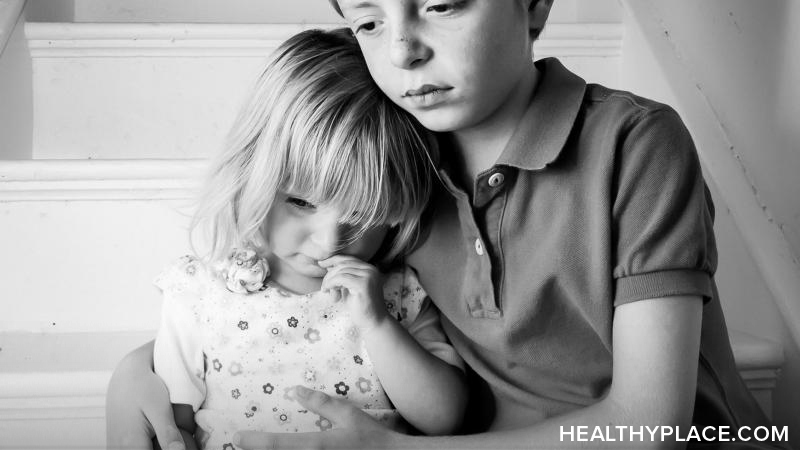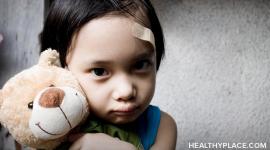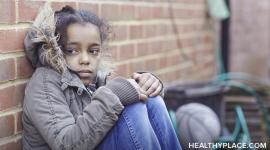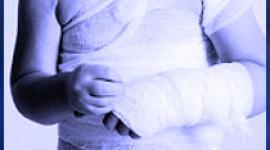Physically Abused Children: Who Would Hurt a Child?

If you or anyone you know has hurt a child, you may need to seek therapy and counseling to develop skills that allow you to cope with children's behavior and to discipline effectively. Who would hurt a child? Physical abuse occurs in families of all socioeconomic backgrounds, although children living in single parent, lower-income households are at a higher risk of experiencing physical and sexual abuse. Regardless of these factors, any child, regardless of gender or age, could become a victim of physical abuse.
Hurt a Child? Not Me!
Don't think you could ever hurt a child? Hopefully not, but a landmark research study, Third National Incidence Study of Child Abuse and Neglect (Sedlak & Broadhurst, 1996), shows that children of single female parents, especially those where there is no connection with the father, carry a significantly higher risk of becoming abusers.
This certainly does not mean that all single parents have the potential to engage in the physical abuse of children. Simply that physical abuse of children occurs in single-parent households at twice the rate of those in two-parent households.
The social isolation, lack of caregiver resources, and low levels of emotional support increase stress levels and the burdens of parenting in single-parent households. Single parents may lack adequate models from their pasts and often do not have the skills to make sound disciplinary choices. These factors all contribute to and can lead to the physical abuse of children.
Lower Income Families at Higher Risk for Physical Abuse of Children
Physical abuse of children occurs a lot more often in households earning less than $15,000 annually. In fact, the NIS-3 study, referenced above, shows that children in households below the poverty line are sixteen times more likely to suffer harm and injury due to physical child abuse. The stressors associated with low-income households can lead parents to use inappropriate discipline methods that experts consider physically abusive.
Other Risk Factors Making People More Likely to Hurt a Child
Other risk factors that make a parent more likely to hurt a child, neglect their child, or employ inappropriate discipline methods include:
Parental Risk Factors
- Negative attitudes and lack of knowledge – negative attitudes toward child behavior (whether good behavior or bad) and lack of knowledge about child development can contribute to physical abuse of children. These parents or caregivers have unrealistic expectations of their child's development.
- Marital conflict and domestic violence – children who witness domestic violence are more likely to experience physical abuse themselves. Even if they do not experience the abuse, they may suffer significant psychological issues due to witnessing the violence.
- Stress – High levels of stress – from financial concerns, health issues, social isolation, and interpersonal problems – can cause parents to have inappropriately strong responses to their child's behavior.
- Dysfunctional parent-child interaction – parents who lack appropriate parental modeling from their own pasts, rarely recognize and reward positive behaviors of their children. Likewise, they mete out inappropriately harsh disciplinary strategies rather than positive parenting strategies (e.g. reasoning, time-outs, encouraging successes).
Child Risk Factors
Children with the following risk factors are at a higher risk of becoming victims of physical abuse:
- Children with medical issues or developmental delays
- Unwanted children (accidental pregnancy)
- Difficult children (children with behavior problems, such as ADHD)
- Children with babysitters under considerable life stress
- Children with significant mental health issues, such as schizophrenia, major depression, or substance addictions
Recognizing these risk factors and getting help for at-risk families could alleviate some of the danger that the children involved will suffer physical abuse. Education about proper parenting and effective discipline as well as directing the family toward social services that can mitigate some of their financial burdens may help break the cycle of child abuse.
APA Reference
Gluck, S.
(2021, December 17). Physically Abused Children: Who Would Hurt a Child?, HealthyPlace. Retrieved
on 2025, December 23 from https://www.healthyplace.com/abuse/child-physical-abuse/physically-abused-children-who-would-hurt-a-child


